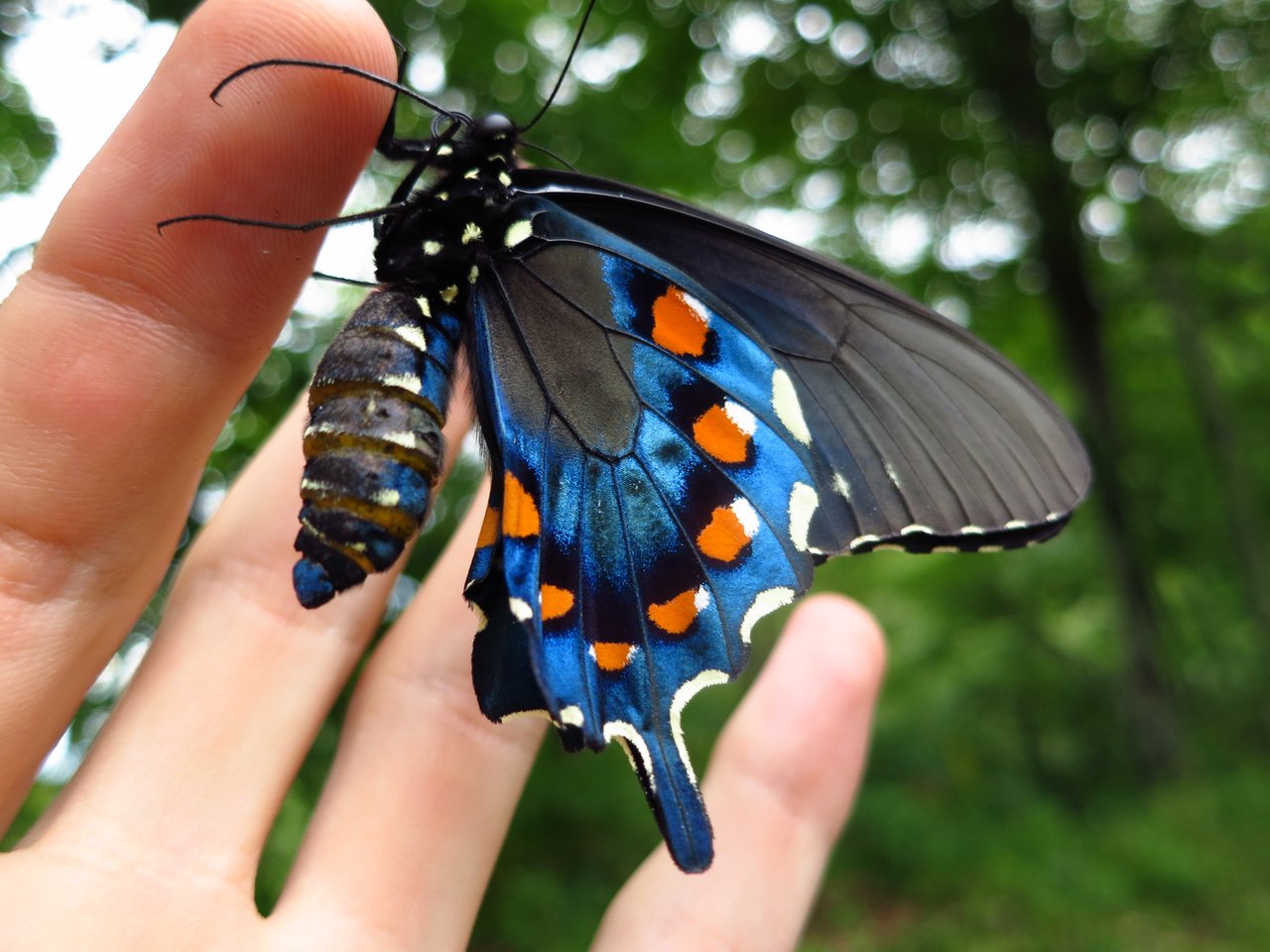The year is 2010, a decade ago. I was 21 years old, and I had just bought my first camera off eBay; a cheap compact Samsung HZ10W.
There were many firsts for me in 2010, it was a year of newfound freedom, transformation, self-reinvention, adventure. Around this time I started running my first business in online sales, bought my first car, and left to travel during my long-awaited first year with any real freedoms. Freedom from a dull, soul-sucking 40+ hour workweek in a factory, freedom from any misguided pressures or expectations from my father, from bosses, from any "peers".
After a couple years of truly desperate planning, I had a built up a better income from online sales than I'd earned at any job I'd had. I bought my first car, quit my factory job, and left my father's house to go travel, to discover what the much larger world than I'd known, breaking all my habits at once by throwing myself into the unfamiliarity of solo travel. I would go out and discover more of the world, and actualize a much greater potential for myself than had ever been possible.
My intention was to completely transform every aspect of my life. No habits, leaving behind everything familiar, giving no one else any control, influence, or expectations over me. I chased highest level of individual sovereignty possible, to put pressure on myself to take control, putting myself in a profoundly novel situation where it would be imperative and simply logical for me to dispel any notions that I could blame anyone or anything else for any problems. I realized that if I were to make good use of my newfound freedom it would also be necessary to shift my outlook to an entirely internal locus of control. It should be clear at this point that I had a longstanding obsession with escape, from years of asking myself what I could do, what I might achieve, if I had a higher level of freedom.
I could write for days and days about this transformative experience, and the extreme disatisfaction that I endured, even cultivated, leading up to my escape that inspired me to plan meticulously for a great and sudden change. Its tempting to write all that, a copy of my own "declaration of independence"-- to detail all of that-- as I saw it then, and as it relates to the place I find myself today.
But I had to stop myself just now, as I began to write far more about that than is necessary for what will appear to the outside world to be a simple photo collection from a most-eventful year in some random overly-eccentric steemit-creator's life.
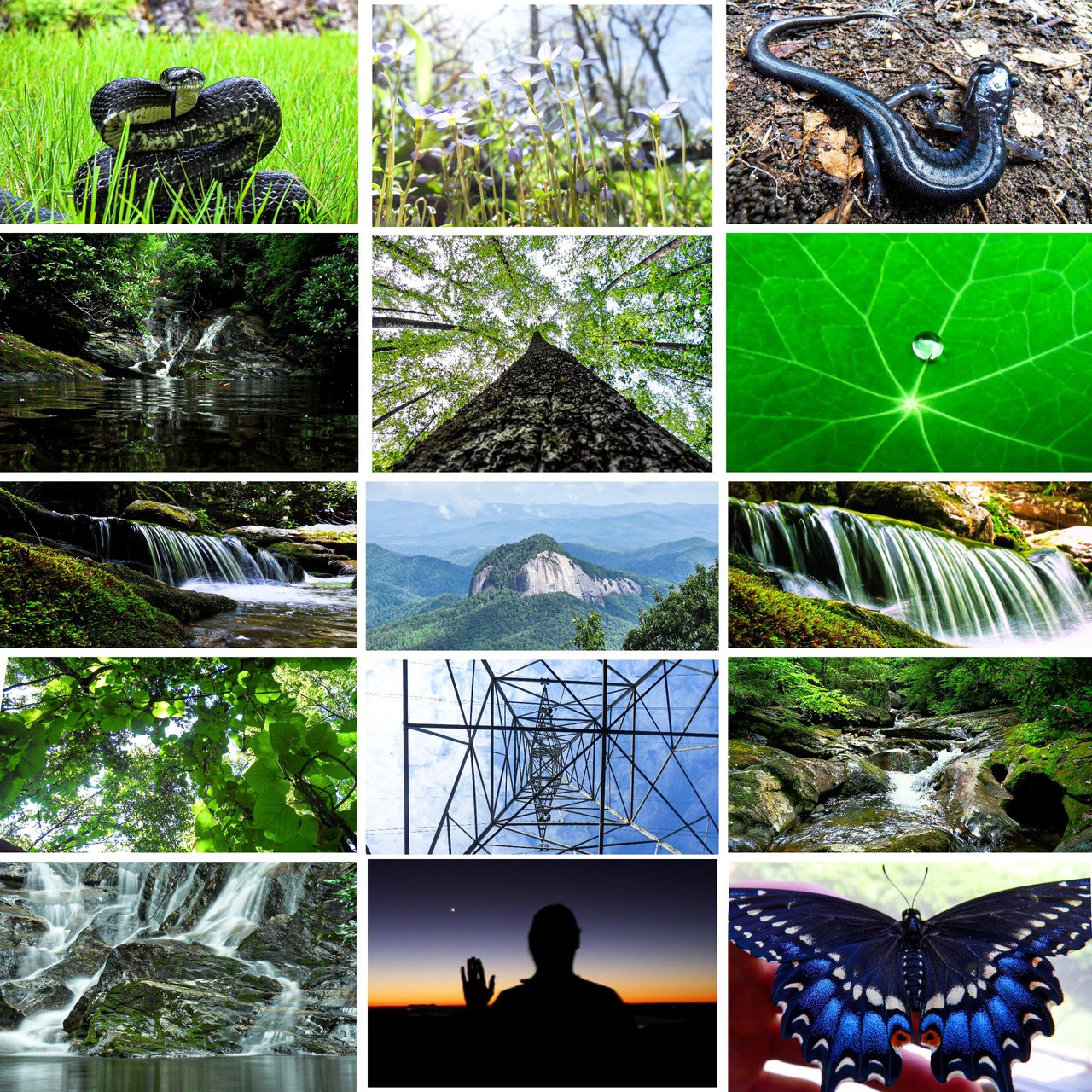
That's what this post will be about: a small set of pictures I took with my first camera, after my pilgrimage from Cleveland to Asheville:
A single serving of images that serve to express a place, and document my early experiences & discoveries in the Southern Appalachian mountains.
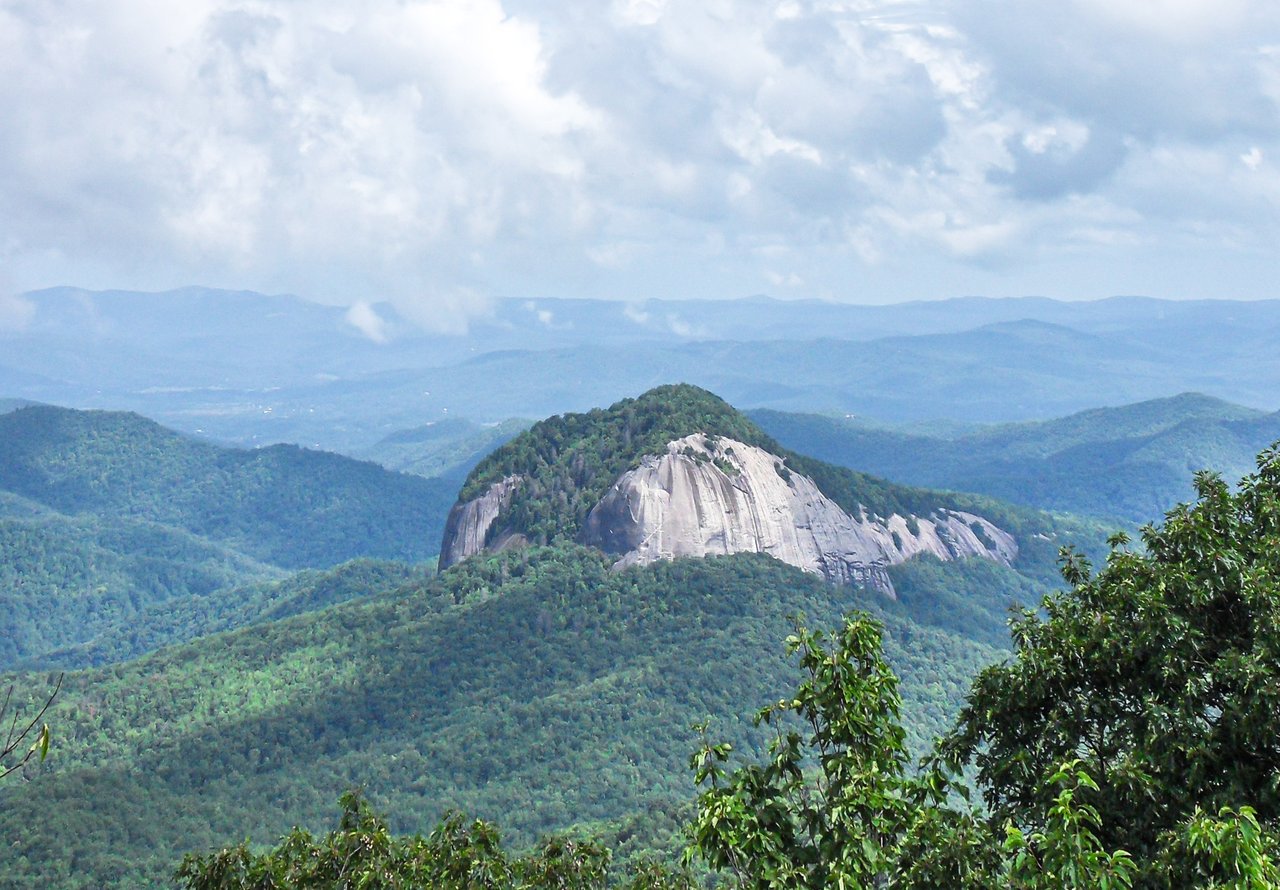
[Looking Glass Rock]
A simple overlook snapshot. I suppose this is a good place to start. My intention was to travel around, mostly sleeping in my car with occasional hotel rooms, short stays with new friends, often washing up with my country-wide gym membership or by jumping into the nearest body of water. Adapting to a nomadic lifestyle that I created in theory and had to test to see which parts worked and which didn't. I traveled a lot, and still do, but I spent more time in Asheville than I had planned, people kept asking if I needed places to stay, and it eventually became a new home base. I knew someone in Asheville, a sort of penpal with whom I developed an important friendship after playing together on an obscure StarCraft server years earlier. "Ernie" (screen name) was my age, and lived in Asheville, and it was with him that I first explored the area pictured, the Looking Glass Rock overlook, in the mountains, on the Blue Ridge Parkway. Most of the following images were taken during off-trail explorations that began at that overlook.

[Sunshine Bluets]
Yes, the images are starting off very simple and basic, I know. I was on my first visit to the mountains with Ernie as my trail guide when I saw these little flowers. The path we took today, and these first few moments with a camera, would influence my future in a bigger way than I could have imagined. I suppose I was quite open to the influence of experience, seeing as I had just hit the "delete" button on every aspect of my past and had plenty of room to plant new seeds.
Remember that this is my first outing with a camera, one of the very oldest images I've taken. Right from the start, I was intrigued by the possibilities of creative shots and unusual angles, trying to avoid taking the type of shots that would come natural to anyone. I certainly knew nothing about the technical details of photography or camera settings, but in my experience, the creative journey starts with being inspired to apply whatever it is you already know, with whatever tools you have to work with, teaching yourself along the way. I would call this the "passion" route, for which I would advise always pursuing the ideas that you find most interesting, in each present moment. The "discipline" route is useful for balancing out the "passion" method, to keep moving forward when you're lacking inspiration. But all this, my personal philosophical ideas, can be explored in a different post. As a final thought, the third mode in my trichotomy is "distraction", which is the only mode that I condemn as being useless. I'll define distraction as failure to tune out the noise and prioritize your values. The kind of unfocused comfort-seeking shortcomings that derail you and delay the fulfilling of your potentials. Obviously, which activities fall into which category is for the individual to decide.
OK, enough waffling, back to the photos.

[Serpent]
A black rat snake I met, close to the parkway overlook where the Looking Glass Rock was taken. Yes, I got him to pose like that by encroaching on his territory. I wrangled him, Steve Irwin style, and showed him off to tourists in the area. Crikey!

[Black Salamander]
Another critter shot! Mere feet away from the little sunshine bluet flowers, I stepped off the trail and flipped a log, expecting to find one of these. Sure enough; there he was. That was easy!
Back in my childhood adventure days in the 90s, in the-land-before-internet, I was a little citizen scientist. It started when I was 4 or 5. I spent all my time outdoors finding critters, identifying species, and I lead a posse of other kids in the neighborhood to do the same, enlisting them to help me cover more ground finding critters and teaching them what I knew. When I couldn't be outdoors, I was surely inside reading identification guides I borrowed from the library, doing research until I could go out and explore more. My fascination, at first, was most intense with insects-- butterflies and moths, but that interest was later overtaken by reptiles, once I started finding snakes. I studied geology and collected rare stones in a similar manner, also using identification guides to recognize all the rocks, minerals, gems I might find. I even sold the rare stones I found, lemonade-stand style and even door-to-door around the neighborhood. It was successful, but a lot more work and skill went into it. From a business standpoint I probably should have just sold lemonade-- but where's the passion in that? People will buy anything from little kids.
I didn't watch television and never had cable, but after years of leading these critter adventures, I did finally see Steve Irwin's show. Naturally I was inspired seeing that someone else was out there wrangling reptiles like I'd spent all of my time doing as a kid, and he had made career and a TV show out of it! Cool! He taught his viewers about wildlife species, kept young viewers fascinated by showing them a variety of strange creatures they hadn't seen before, the way I did with the neighborhood kids in my little neighborhood cult of wildlife discovery. Another idea that capitalized on this childhood fascination with (fictional) species discovery was Pokémon. It's an innate curiosity that kids are prone to, but I guess I probably went deeper into that fascination with finding & identifying species than most kids.
And wouldn't you know it? Ernie had never seen something like this salamander, he couldn't believe I just found such a thing on my first attempt. My old trick still works, even as an adult, finding interesting critters to add to the adventure. My eyes are open wide by the beautiful exotic surroundings-- I've never hiked in mountains, Northeast Ohio hardly even has hills! But I know my guide here has seen this place a million times, and its nice to see that my critter skills can add novelty to a hike, even for the locals.
.jpg)
[Things Are Lookin' Up]
I'll give y'all a break from the critter images, there's more later. But we can still play species identification games. The central tree is a tulip poplar. I was inspired by the long, straight, telephone-pole like trunks they often have, so once again I'm experimenting with taking uniquely-angled images. I think of this type of shot as an overdone cliché today, but consider that I'd never seen a shot like this at the time. This was long before instagram, at a time when I didn't have facebook. I took this before we'd all been exposed to every photographic cliché imaginable on social media, and strangely enough I haven't published a similarly angled shot in 10 years since. Probably because I'm inspired by things that I've never done, and by things that I haven't seen anyone else do. This sort of shot has been done, by me, and by everyone else with a camera. It's hard to make something overdone feel interesting or special, but someday I'll do another shot like this. I'll just have to add something new in the mix to justify it.

[Do You Hear That?]
Ok, so past that tulip tree, and those coldblooded critters, my guide Ernie took me to Skinny Dip Falls, a popular swimming hole attraction accessed from the overlook in the first shot. I didn't save pictures from this area from this first visit, but I've shared plenty of recent images of this spot in other posts.
The places he's shown me this day are blowing my mind, the mountains here feel like a vast unexplored rainforest to me. I think of the neighborhood creeks I would wade in for miles as a kid, catching fish with a net. The "Metroparks" I explored in Ohio were exactly what they sound like-- a tiny patch of forest surrounded by city, one little chunk of trees that hasn't been destroyed in a large suburban civilization. But those were the places that shaped me, when I was 5-10. The nature here, way up in the appalachians feels like the real deal. An ecologically rich, beautiful forest that appears to go on forever, just wild lands with no structures, hardly any people, even on the main trails. Imagine the discoveries I'd have made if I'd grown up here!
We pass skinny dip falls and I purposefully suggest that we take a trail that he is less familiar with, because I see value in discovering something new, not just for myself, but also for anyone else on the journey with me, too. We're way past skinny dip falls, the main attraction here, and we don't quite know where we're headed. I'm not concerned about that at all, as I've unconsciously developed an incredible sense of direction from a lifetime of adventurous explorations. In fact I want to get off the trail. Anything here on this trail has been discovered already by others. It's been an absolutely amazing hike already, yes, but I hear running water. The loud rushing static sound of a high water-volume crashing on rocks, far away, echoing up the steep hill from somewhere far below us. Ernie has already denied my attempts to direct us off trail once (lame) but he hears the rushing water too. Its the kind of sound we heard back at the popular attraction of skinny dip falls, but neither of us can guess exactly where this sound is coming from. It must be another waterfall, much more remote, and possibly undiscovered. How tall is it? Can we swim there? What does it look like and has anyone ever taken pictures of it? I'm so excited and determined to go check it out, that I'm able to convince my now-reluctant guide to attempt to bushwhack through the thick undergrowth and find what must be a new waterfall!
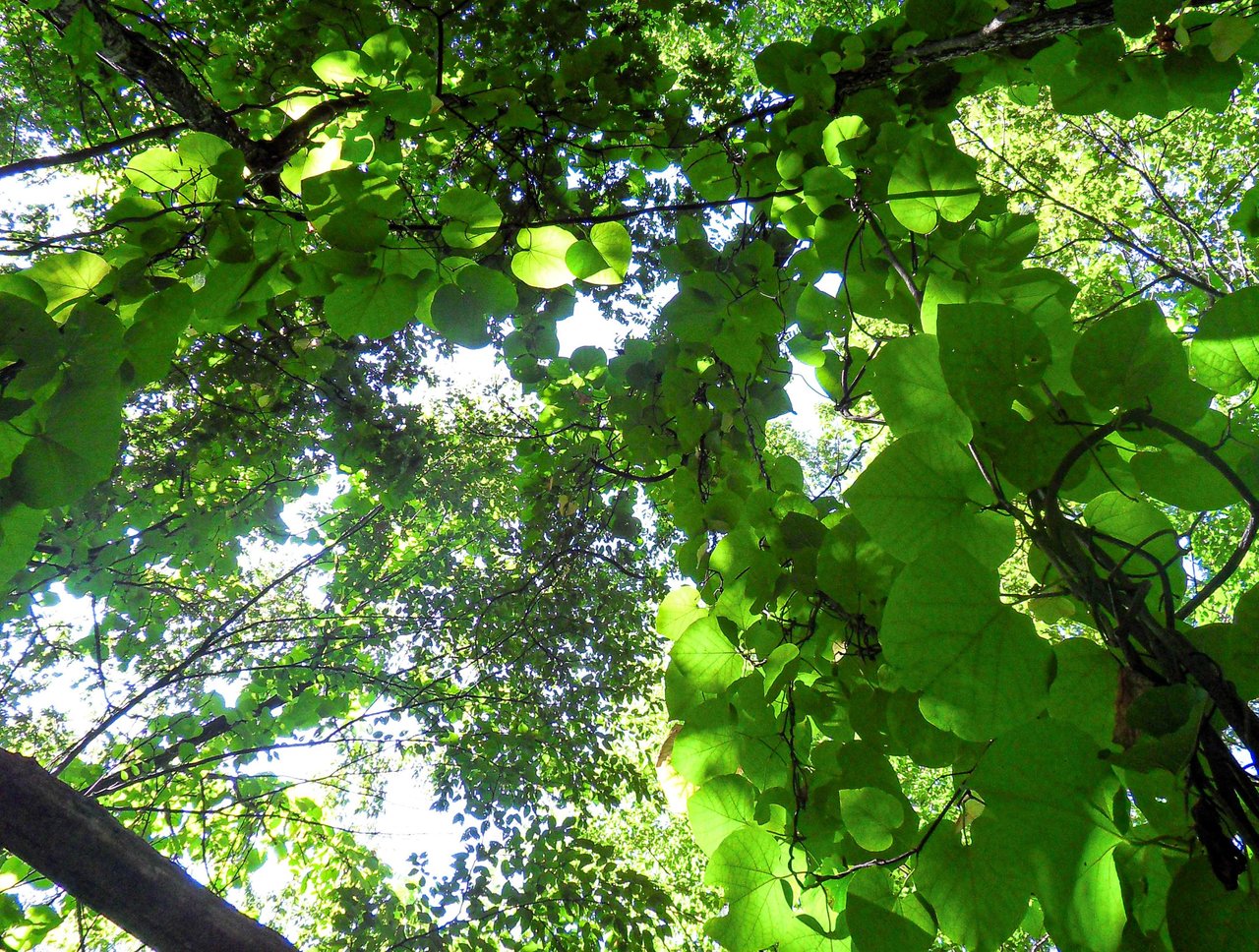
[Pipevine]
Bushwhacking intermission. Ok, I have to give Ernie credit here, because my off trail shenanigans started of difficult, and soon became outright treacherous. We did eventually make it all the way down and discovered the source of that crashing-waters sound. But it was rough, really rough. This was my first firsthand experience of getting stuck in "hells" of rhododendrons, a term made famous in the book 'Cold Mountain' by Charles Frazier. Coincidentally the book takes place right here, in the area we were hiking. Cold Mountain itself is visible from the high ground here, and is a day's hike away.
So we're getting closer, the sound is getting louder, and the route we're improvising just keeps throwing curveballs. It's unbelievable how steep and inaccessible it becomes as we get closer. The sound of rushing water starts feeling "just below the next cliff". After a few dead-ends into impasses of thick rhododendron hells, Ernie comments that he wishes he brought the machete, referencing a large blade I had sold and shipped to him years earlier. We keep having to backtrack 10-20 feet (which is a lot of work in this thick brush) to find safer routes scaling the steep sides of the mountain as we get within throwing distance of what must be a waterfall. But it's so damn steep, with so many fallen trees and overgrown rhododendrons that we still can't see it. Well, we sure haven't come all this way to get within feet of it, still unable to see the waterfall, just to turn around and whack our way back up. One more cliff, down the slick rocks, as smaller tributary streams running over the ground around us soak into our shoes and cause us to slip and slide, with the two of us often climbing or hanging on to the thick rhododendron branches to keep from sliding uncontrollably into the unexplored ravine below us. It isn't until we reach the stream itself that we have a view of a waterfall, but we make it, and there are waterfalls.
Before we get to that, I'll explain the picture looking up at the vines. I use it as a segue to tell our bushwhacking story, but it's actually from another hike that year in the same area. A couple weeks later I took another off trail bushwhacking adventure to investigate a very out-of-places structure that I spotted while studying satellite images of the area, a large oval shaped white spot on a steep edge of Cold Mountain, its shape visibility unobstructed by the dense forest surrounding it. I had no idea what it was from the low-detail satellite images, but the most exciting possibility I imagined was something that crashed out there deep in the forest, a meteor or some kind of aircraft perhaps. I'll have to save that story for another time, but I did find it. Unfortunately it wasn’t a crashed UFO. 👽
About those vines: My camera's image quality and my photographic inexperience at the time don't do the view justice, but the amazing view from below isn't the only thing that excited me about these vines. I wasn't sure what they were, I'd never seen anything like them before, but when I discovered the vines, I (hopefully) thought that they could be pipevine. To me pipevine was an elusive, almost mythological-seeming plant that I'd read about in my identification guides many times in my childhood. Could these towering 100 foot vines that reach from the forest floor to the treetops on the side of cold mountain be pipevine? What are the odds? I don't even know where the vine is native, there was certainly no pipevine where I grew up, and I hardly know any native species around here. There are dozens of vines out here that I can't identify, in addition to this one. I don't even know what pipevine looks like, I just want it to be pipevine because the vines are majestic sight, and pipevine is memorable to me as the host plant for pipevine swallowtails-- another elusive species (of butterfly) I've seen pictures of all my life, but never once encountered. Took me a while to check my assumption, but it was even more exciting when I realized that yes, by some ridiculous statistical probability one of the only vines I know the name of turned out to be a match for the only vine I took the time to photograph.
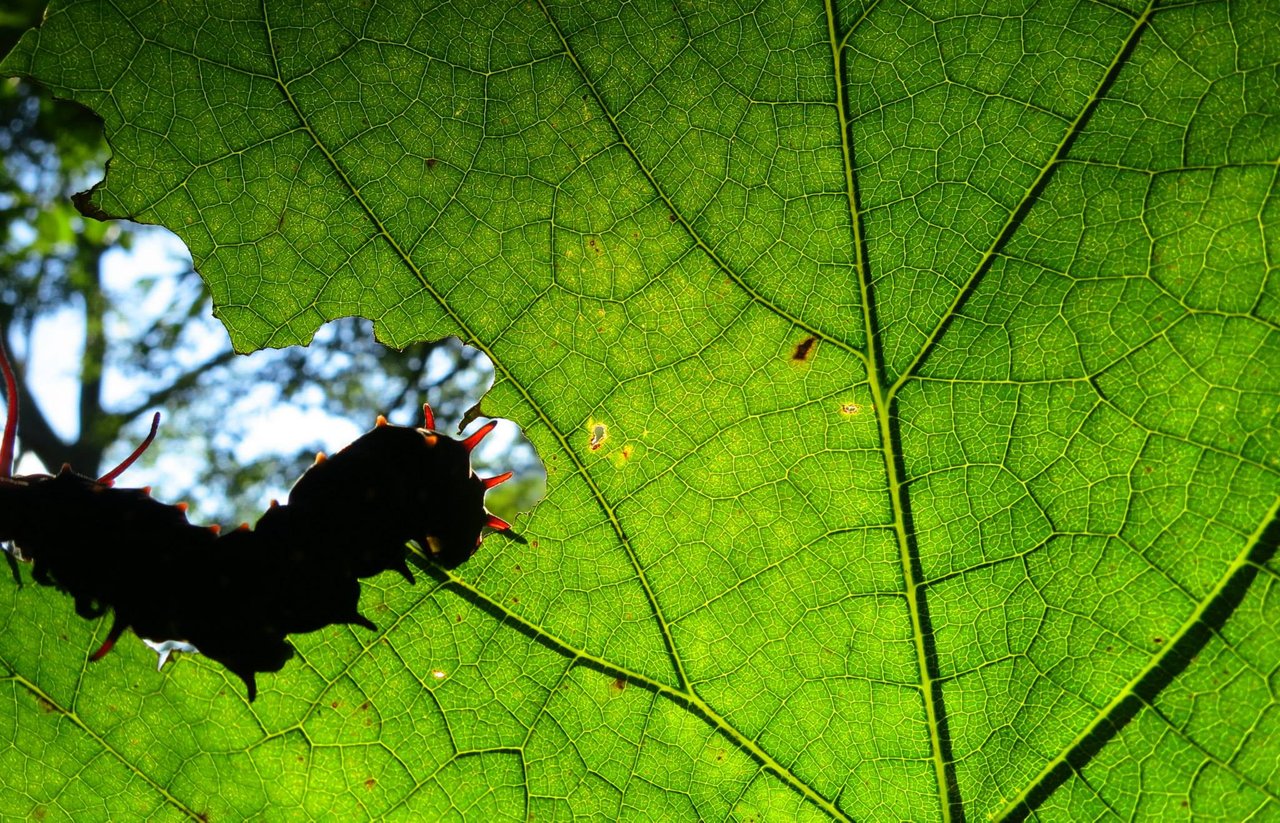
[Munching On Pipevine]
The vines did turn out to pipevine, a now-familiar plant that I’ve grown a garden full of. This image has the larvae of a pipevine swallowtail that I'd read about, eating a large leaf of the pipevine. In the years since this trip, I introduced a large population of these swallowtails into to my neighborhood by hosting them on many robust vines in my garden. They are native to this area, but aren’t usually seen around residential areas, since they require their host plants to successfully reproduce. They’re very abundant here now, thanks to my vines. I seasonally supply entomologists, photographers, and other other citizen scientists with live specimens farmed in my garden, and I offer swallowtails to others folks who have suitable pipevine plants so they can populate their neighborhoods as well. I’m aware of the viral campaign that came out a few years ago of someone else doing exactly what I’ve described here, that’s not me. I guess I did it before him, as I’m sure many others have, I didn’t try to promote it publicly on social media. I don’t know if he capitalized on it, but his posts got shared all over and he had cool photos, so good for him.
[Pipevine Swallowtail]
I've been working on this 2010 Collection Steemit post for so long, that I've since had another encounter and written another story about this particular species swallowtail butterfly. I'll link that again in the comments, but that post can be found here: @kadoka/angel-visits-a-swallowtail-fluttering-around-my-room-in-february-and-other-stranger-occurrences
With all my talk citizen science, my obsessions with identifying nature, it's worth mentioning that all of that felt like an inaccessible past life during the 10 years prior to this trip. That was a big part of my identity when I was a child, from 5-10 years of age. Shortly after I turned 10, all of my previous memories and behaviors became something that I needed to abandon, not spoken of again for the next 10 years. A short lifetime of what used to be reality, my life, was then denied, avoided, and all but erased from my memory. The significance of this acknowledgement of the past, being in a better place on this trip where I no longer felt the need to block out the memories of my childhood is a bit too much to explain here. I wrote all of that, but I won't include it today. Explaining the significance of all this, and what was happening leading up to this trip would exponentially lengthen this post, and would require detailing very intense traumas. My mind went that direction, and I wrote about all of that, but it seems far too intense and lengthy to include here in this post. Besides, weren't we on our way to discover some kind of waterfall?
Oh yeah...
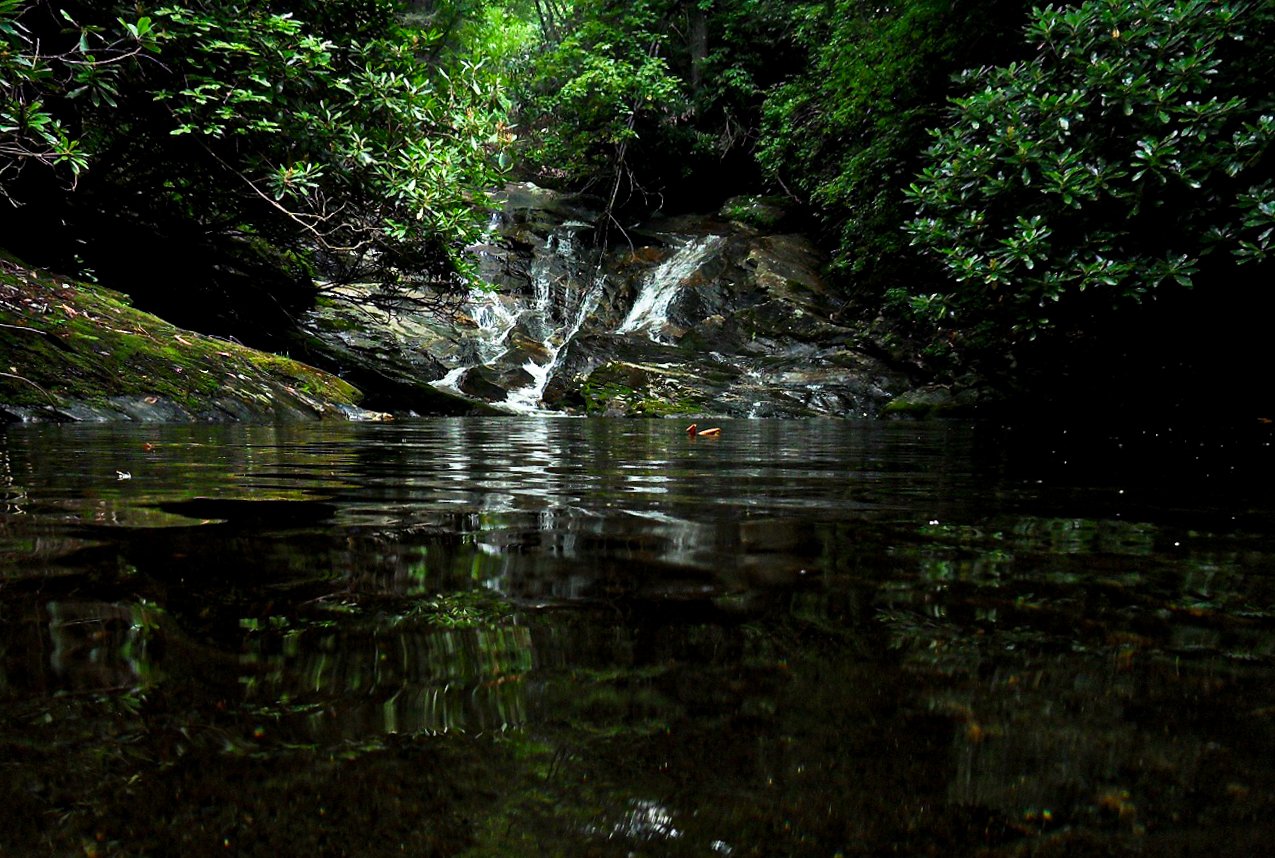
[Discovery of The Dark Prong]
We made it! And there are waterfalls! How could there not be, in this mountainous terrain? This distant water-level perspective of this first waterfall was Ernie's idea. As I speculated, every turn of a stream out here in the mountains contains waterfalls, with this much elevation change there are always waterfalls, all you have to do is find a stream and follow it up. As you make your way up one of these streams, higher into the mountains, you'll encounter another series of waterfalls around every bend.

["Kadoka Falls"]
In order to follow the stream we discovered that day, The Dark Prong, explorers must wade, rock hop, swim across deep pools, and climb over the waterfalls to progress toward the top. The steep, overgrown mountain bases on either side of the stream are often impassable, it often isn't a viable option to try to cut through the steep overgrown mountainsides to bypass a stretch of the stream. It isn't easy to take the water route, but it is still much easier than trying to follow the stream on land. This old 2010 photo of that first waterfall is my first attempt at using a tripod and long exposure techniques to show water motion.
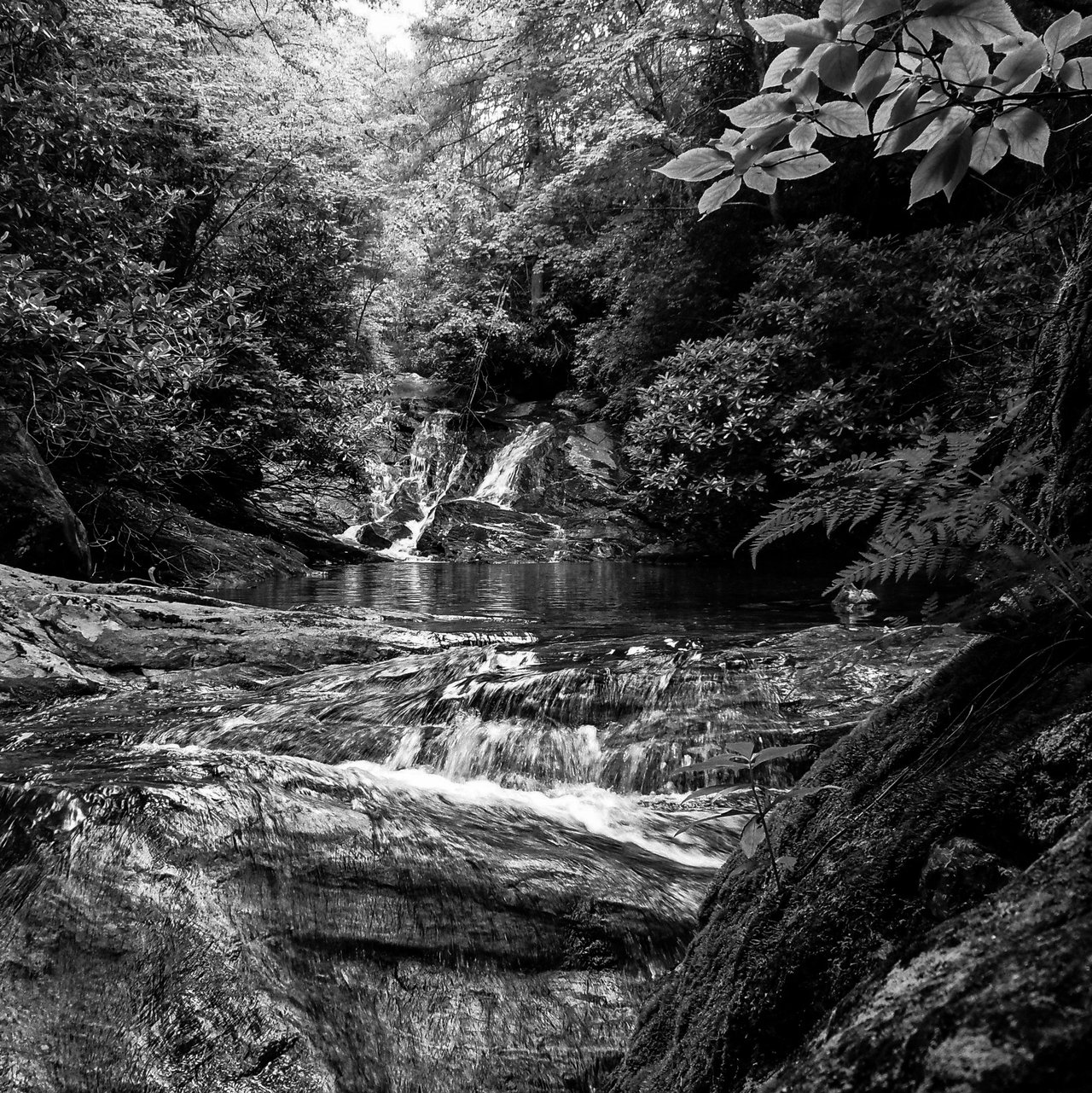
[Before The Tree Fell]
It just so happens that this first discovery of this falls would be one of my last and only opportunities to photograph the waterfall in this condition... unobstructed. A couple months later, a very large tree fell right in front of the falls that has remained there since 2011.
This falls, and The Dark Prong have scarcely been explored by others. After our discovery that day, I did deep web searches looking for other references to the stream and these waterfalls. Today, in 2020, there are still just a handful of other photographs of the stream and this waterfall on the internet. I found a very old christian book that contained a chapter where the protagonists journey to The Dark Prong, but I'm unable to recall the name of that book or find it today.
Some of you may have noticed that I (arrogantly?) titled the first image of this falls "Kadoka Falls"-- the name I gave it when Ernie and I discovered it that day, named after a screen name I used in our online community before we'd met, that you'll notice I still use today. It seems others have called this particular falls simply Dark Prong Falls, so I refer to it as that these days. The Dark Prong Falls is the easiest waterfall on the stream to find, most of the other ones are even more difficult to access. This adventure was the first of many, many, rockhopping meditative journeys I that I would take every year after, and occasionally I brought others along who were crazy enough to enroll in one of my crazy adventures. I named many of the other waterfalls further up the stream that year, most of which have no other photographs online and no names other than the ones I gave them.
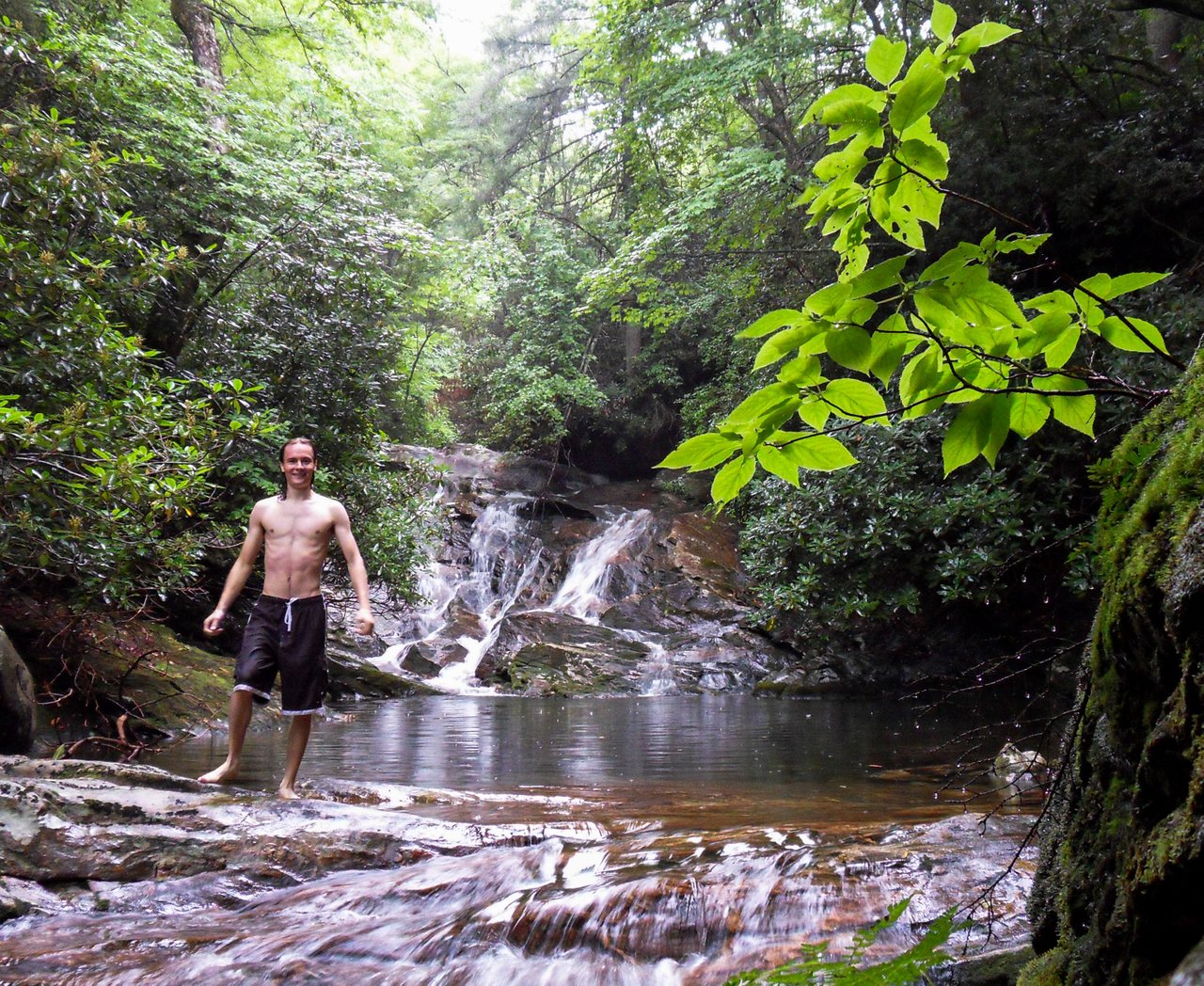
[Discover]
I'll reluctantly include this image of myself from that first trip in 2010. I still had the Jesus hair from being an antisocial hermit in Ohio.

[Small Falls #1, Spring Blue]
Keeping in line with the theme of only using images from 2010, this is another, very small shelf waterfall I found much further up the stream on a subsequent trip up the stream a couple weeks after the initial discovery.

[Small Falls #2, Summer Green]
Another image of the watershelf minature waterfall that I liked so much, a photograph that I took later that summer.
.jpg)
[A Special Place]
I have much, much better images of this bend, one of my favorite sites to photograph along this stream. But this is the 2010 image, so this is the one I get to include in this set. I have an ongoing 10-year project of photos, videos, drone flights up The Dark Prong that I will someday finish and publish, and that is where I'll include the best footage I have from all the years since.
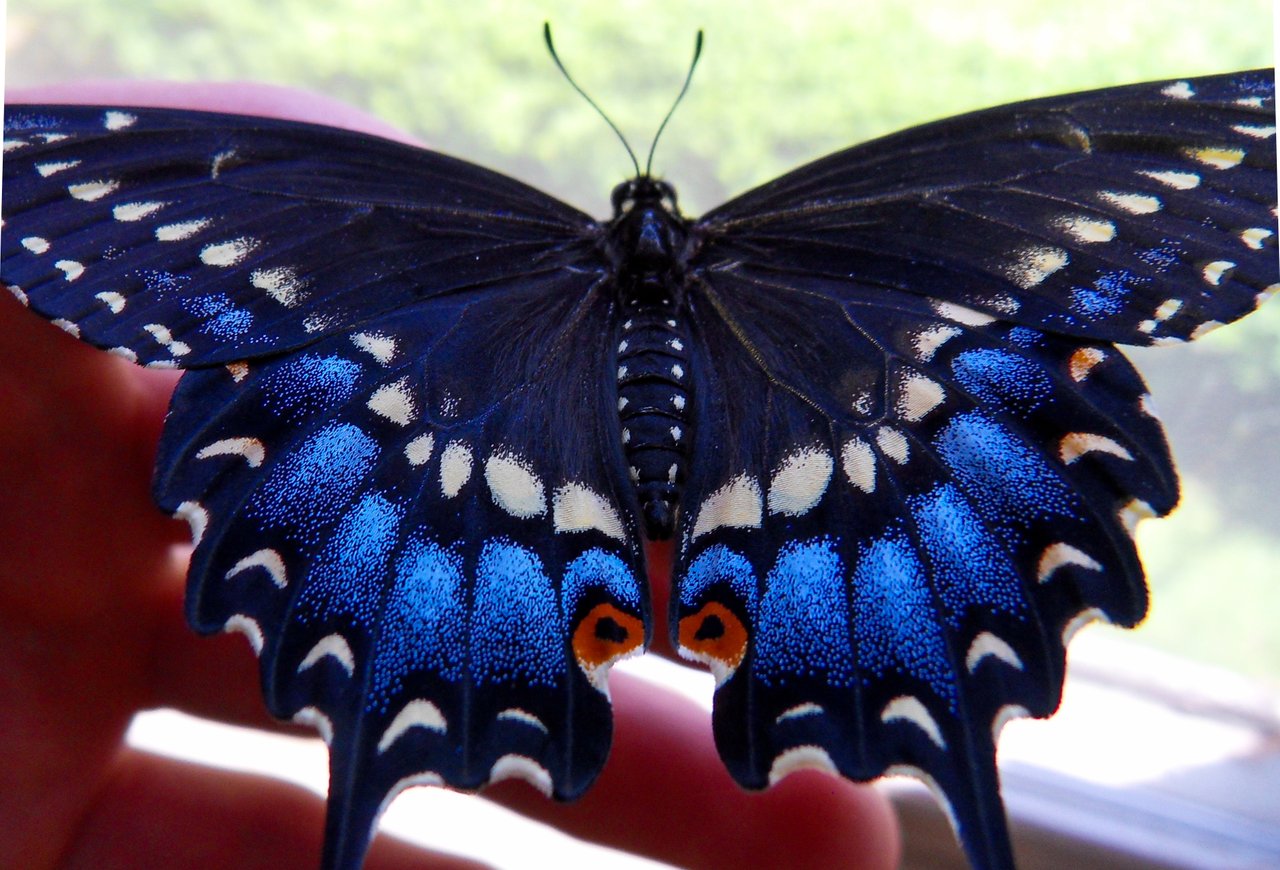
[Black Swallowtail]
This is perhaps the first swallowtail that I had raised in many years, from a caterpillar I found on a hike. A black swallowtail. Perhaps still the best image I have of this less-common species.
.jpg)
[Nasturtium Droplet]
Perhaps my favorite image from this first year with a camera. I was very impressed with the "macro" quality of this cheap compact camera... and it was in the making of this image that I discovered the camera's strength at a closeup distance. The hydrophobic qualities of the nasturtium leaves allow for an interesting beading of water into perfect spheres. The nasturtium was shot on the back porch at the house I stayed in with Ernie here in Asheville.

[Looking Up Again]
This tower photo was taken from the bushwhacking adventure to investigate what I saw on the satellite images that I mentioned earlier. On the way to debunk my "UFO", you could say.
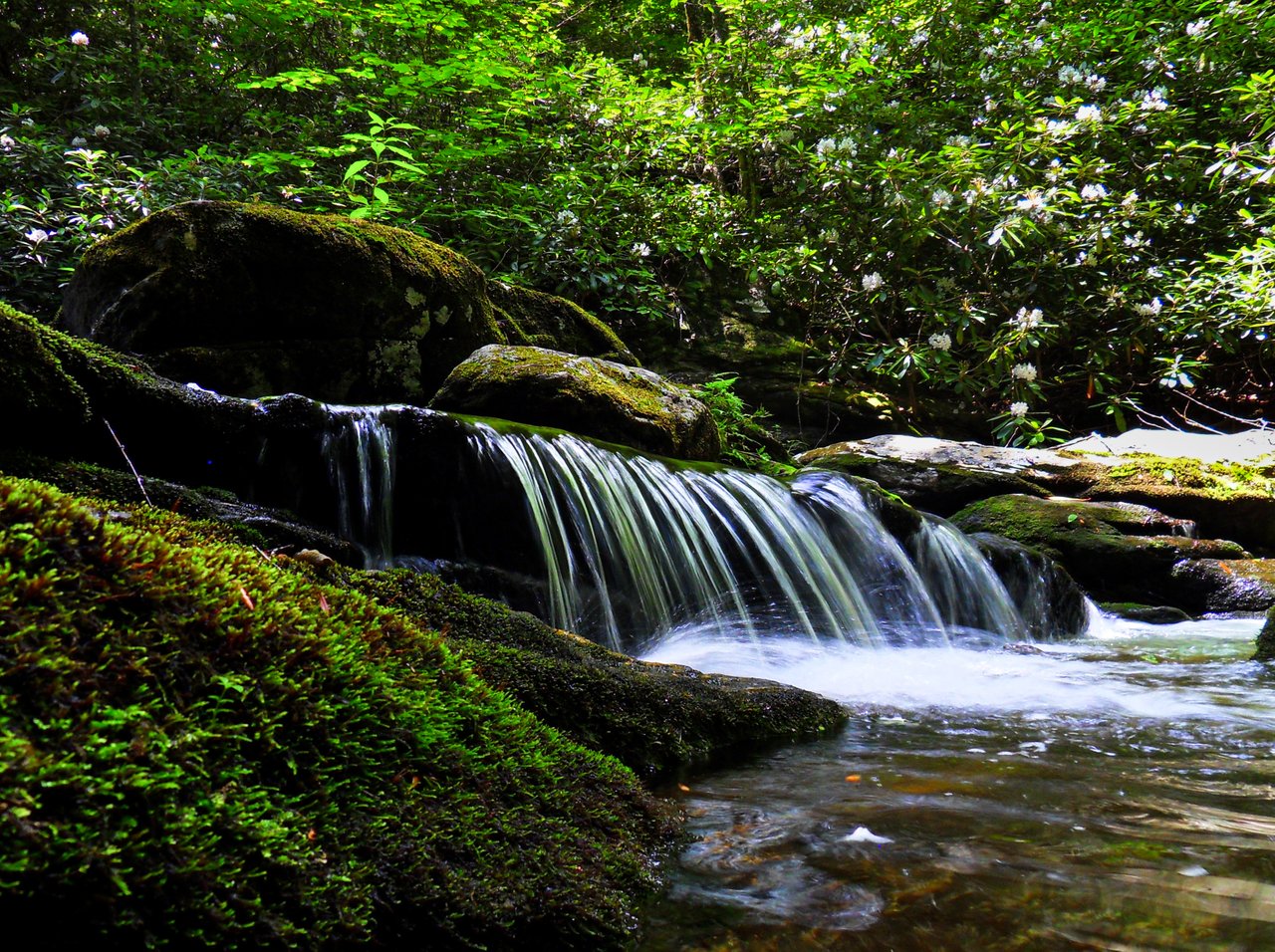
[Atoof]
I saved a third image from 2010 of the small watershelf for last. This file that's been on my hard drive for 10 years was named "Atoof" which sort of sounds like a sneeze. It took a bit of effort to recall what "Atoof" was supposed to mean, but I figured it out. It was an acronym, "another take on an old favorite"-- acknowledgement that I'd taken a long journey to shoot that same little waterfall yet again. And I'd shoot it many, many, more times, I flew over it shooting video with a drone recently.
I won't deny that these images contain something more, something less tangible:
In my eyes, these images reflect some things that only I will see, but also things that others can only see if I give you the proper framework, nudge you to adjust your focal point.
These photos are strongly associated with profound change that took place inside me, in addition to their being my best attempt to remember, show, and praise these "holy" places and experiences from a great transformational period in my life. The trip up the Dark Prong is still a spiritual meditative journey that I take frequently, a visit to a special place that often begins before sunrise and has me lost in the forest well after sunset. It's a spiritual commitment I make, fasting the entire day, no food, occasionally drinking from the clean stream, swimming across deep pools of water while holding my camera in my mouth to keep it above the water a necessary skill just to reach "the top". I suppose it isn't fair to say there's a top, but I follow the stream until I'm so high up in the mountains and the water volume is so low that I can confidently assume that there won't be any more interesting waterfalls further up. To me, that is the top.
My level of focused intensity may never again be quite as clear, as loud, as inspiring, as it was back then. I'd like to say I'll outdo myself, and I look forward with plans and ideas of how to get reach new peaks in the future. I look back, reconnect, and update the best versions of myself to ensure that the essence of my best old modes of being are still relevant and practical to apply to my life in the present. Revisiting these sacred places and telling stories like this one remind me of the profound truths I took to heart in the past. After such a long period of time, even some of the most precious wisdom can be neglected, sitting in the box marked "NEVER FORGET!" collecting dust in the storage unit of my mind, buried behind the more recent entries in my horde of precious first-hand experiential truths. I can't utilize and carry all of the truth I've collected-- <error: insufficient memory> -- but I make my best effort to keep my concise-summary version as my mantra. Revisiting these places, and looking over these old images trigger dreamlike recollections of my previous adventures and reawaken awareness in the present when I risk becoming too comfortable or too disconnected from my past versions of self.

Thank you for following along on this reflective journey back to where I was in 2010. I hope all my crazy ideas, stories and amateur photographs are 1/10th as useful to any readers that found this as these experiences and their retelling was to me.

